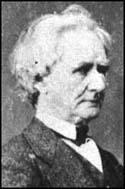Simon Cameron

Simon Cameron was born in Maytown, Pennsylvania on 8th March, 1799. After a brief schooling Cameron became a newspaper editor and a successful businessman. This included investments in canals, railroads and the iron industry.
Cameron was active in politics, being a member of the Whig Party before joining the Democratic Party. He was elected to the Senate in 1845. Later he joined the Know Nothing Party in 1855 before finally entering the Republican Party. This constant switching of parties gave Cameron a reputation as a political opportunist.
In 1860 Cameron was one of those nominated to become the presidential candidate of the Republican Party. However, at the National Convention, when it was clear that Cameron could not win, he gave his full support to Abraham Lincoln. He was rewarded by being appointed as Secretary of War. This job became more important on the outbreak of the American Civil War.
In January, 1862, Edwin M. Stanton, his legal adviser, helped Cameron write his yearly report. He personally wrote the section that called for freed slaves to be armed and used against the Confederate Army. President Abraham Lincoln was opposed to this policy and ordered Cameron to remove the offending passage. When he refused he was removed from office. Lincoln, who was unaware of Stanton's role in the report, appointed him as his new Secretary of War.
Cameron now became America's representative in Russia. Cameron returned to the Senate in 1867 and in 1872 served as chairman of the Foreign Relations Committee. Simon Cameron, who resigned his seat in the Senate in 1877 in order to help his son replace him, died in Donegal Springs, 26th June, 1889.
Primary Sources
(1) Henry Villard was a reporter of the New York Tribune during the American Civil War.
Cameron was the typical American politician with a well-defined purpose in all he said and did. He also held himself a little too freely at the disposal of newspapers men, to whom he was by far the most cordial and talkative of all the secretaries. He made them feel at once as though they had met an old acquaintance and friend. He was certainly the cleverest political manager in the Cabinet, and, though unquestionably as ambitious as any member of it, he never was guilty of the indiscretions which the political records of Seward and Chase reveal. He had a very shrewd way of tempting journalists by implications and insinuations into publishing things about others that he wished to have said without becoming responsible for them.
(2) Section of the report written by Edwin M. Stanton that led to Simon Cameron losing his job as secretary of war (January, 1862)
Those who make war against the Government justly forfeit all rights of property and, as the labour and service of their slaves constitute the chief property of the rebels of their slaves constitute the chief property of the rebels, such property should share the common fate of war. It is as clearly the right of this Government to arm slaves when it may became necessary as it is to use gunpowder or guns taken from the enemy.
(3) Gideon Welles, diary entry (January, 1862)
There was reluctance on the part of the president to remove Mr. Cameron and only a conviction of its absolute necessity and the unauthorized assumption of executive power in his Annual Report would have led the President to take the step.

